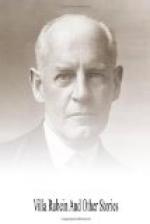Greta answered gravely: “Oh yes, I could. I too am often sad. You are making fun. You are not to make fun to-day, because it is my birthday. Do you think growing up is nice, Herr Harz?”
“No, Fraulein Greta, it is better to have all the time before you.”
They walked on side by side.
“I think,” said Greta, “you are very much afraid of losing time. Chris says that time is nothing.”
“Time is everything,” responded Harz.
“She says that time is nothing, and thought is everything,” Greta murmured, rubbing a rose against her cheek, “but I think you cannot have a thought unless you have the time to think it in. There are the others! Look!”
A cluster of sunshades on the bridge glowed for a moment and was lost in shadow.
“Come,” said Harz, “let’s join them!”
At Meran, under Schloss Tirol, people were streaming across the meadows into the open theatre. Here were tall fellows in mountain dress, with leather breeches, bare knees, and hats with eagles’ feathers; here were fruit-sellers, burghers and their wives, mountebanks, actors, and every kind of visitor. The audience, packed into an enclosure of high boards, sweltered under the burning sun. Cousin Teresa, tall and thin, with hard, red cheeks, shaded her pleasant eyes with her hand.
The play began. It depicted the rising in the Tyrol of 1809: the village life, dances and yodelling; murmurings and exhortations, the warning beat of drums; then the gathering, with flintlocks, pitchforks, knives; the battle and victory; the homecoming, and festival. Then the second gathering, the roar of cannon; betrayal, capture, death. The impassive figure of the patriot Andreas Hofer always in front, black-bearded, leathern-girdled, under the blue sky, against a screen of mountains.
Harz and Christian sat behind the others. He seemed so intent on the play that she did not speak, but watched his face, rigid with a kind of cold excitement; he seemed to be transported by the life passing before them. Something of his feeling seized on her; when the play was over she too was trembling. In pushing their way out they became separated from the others.
“There’s a short cut to the station here,” said Christian; “let’s go this way.”
The path rose a little; a narrow stream crept alongside the meadow, and the hedge was spangled with wild roses. Christian kept glancing shyly at the painter. Since their meeting on the river wall her thoughts had never been at rest. This stranger, with his keen face, insistent eyes, and ceaseless energy, had roused a strange feeling in her; his words had put shape to something in her not yet expressed. She stood aside at a stile to make way for some peasant boys, dusty and rough-haired, who sang and whistled as they went by.
“I was like those boys once,” said Harz.
Christian turned to him quickly. “Ah! that was why you felt the play, so much.”




